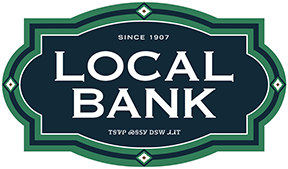10 Tips For Money Management & Building Personal Wealth
Today is a better day than ever to get smart about your money. In our efforts to provide great service to our community, Local Bank has collected our top 10 tips for anyone looking to manage money better, establish good savings habits, and build wealth for the future.
*This is not intended as tax or financial planning advice but is information only.
#1 Take Advantage Of Bank Technology
The most effective savers are the ones that prioritize their savings. Talk to your banker about automatically transferring from checking to savings every month and do it with the first of your gross income. This way saving always comes first, and your goals will be met as quickly as possible.
#2 Determine Needs vs. Wants
A new survey found that 10% of Americans eat out every single day and 56% eat out three times a week. Do you need to eat out that often? Do you need that gourmet cup of coffee in the morning? Track your spending, and start to notice if you're spending your money on things you need or things you want.
#3 Shift Your “Want Money” Into Saving/Investing Money
Lowering the amount you spend on things you want frees up money to save/invest. Dave Ramsey sums it up well when he says: “If you can live like no one else now, you can live like no one else for the rest of your life.” What he means by that, is that living below your means for a while allows you to save and invest your money, when it comes time to cash out on your savings/investments you'll be very glad you did.
#4 Pay Bills On Time
Although 97 percent of Americans pay their bills on time according to this Federal Reserve article, some consumers find themselves paying late fees. Alleviate the hassle by scheduling time once a month to pay bills, and set up automatic bill pay when you can.
#5 Make An Extra Loan Payment Toward Principal At Least Once Per Year
Making an extra loan payment once per year toward the principal loan amount can cut 5 years off the life of your loan, and save you tens of thousands of dollars in interest.
Below is an example from bankrate.com of how prepaying saves money and time: Kaylyn takes out a $120,000 mortgage at a 4.5 percent interest rate. The monthly mortgage principal and interest total $608.02. Here’s what happens when Kaylyn makes just one extra mortgage payment per year:
|
Payment Method |
Pay Off Loan In... |
Total |
Total Interest Saved |
|
Minimum every month |
30 years |
$98,888 |
$0 |
|
13 payments a year |
25 years, 9 months |
$82,870 |
$16,018 |
#6 Consult Your Local Bank
Ask which package of bank products and services would best suit your needs. Want your money to work for you? Put it in a money market account. (If you bank with Local Bank - check out their Super T Account). Your banker is the best source of information about accounts and interest rates available at your bank.
#7 Consider investments
For long-term goals, such as saving for a home or retirement, look into bonds, mutual funds, real estate, and stocks.
#8 Limit Risk Through Diversification
The best money managers don’t put all their eggs in one basket. When you begin to develop wealth, you should strive for diversity in your investments. Diversified investments aim to maximize returns by investing in different areas that would each react differently to the same event.
#9 Create A Zero-Based Budget
Want to make sure you have enough money for everything you need next month? Consider making a zero-based budget. A zero based budget is a budget that provides every dollar a name and specific function before it ever comes in for the month. While expenses and payments will typically make up the largest percentage of a zero based budget, allocating to savings and investing is a part of the zero based budget as well. For more information on Zero-Based Budgets check out this blog by Dave Ramsey.
#10 Start Retirement Planning Early
Time is the most important variable in investing for retirement. If you were to invest $1,000 in a diversified portfolio that returns 10% per year for 20 years you’d have $7,328. If you were to invest it for 40 years instead of 20, that $1,000 would turn into $53,700. Imagine your retirement investing like a snowball, the longer you can let that snowball roll, the more snow it’s going to pick up!
If you liked this article, and would like to learn more about any of the points, please visit us at Local Bank. We were recently voted Best Bank in Tahlequah, and have been serving Tahlequah, Hulbert, Park Hill, Grove, Sallisaw and surrounding areas since 1907. You can call us and we'll take care of you in Park Hill (918) 458-1223, Hulbert (918) 772-2572, or Tahlequah (918) 456-3900.
Listed above are investing estimates. Returns may vary per investor/investment. Super-T percentage yield varies with the 90 day T-Bill rates.
